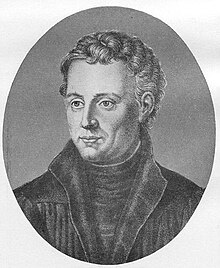Johannes Reuchlin
| Johann Reuchlin | |
|---|---|

Johann Reuchlin
|
|
| Born | 29 January 1455 Pforzheim |
| Died | 30 June 1522 (aged 67) Stuttgart |
| Nationality | German |
| Alma mater |
University of Freiburg University of Orléans University of Poitiers |
| School | Renaissance humanism |
| Institutions | University of Ingolstadt |
|
Main interests
|
Greek language, Hebrew language, law, Christian mysticism |
|
Notable ideas
|
Christian Kabbalah Reuchlinian pronunciation |
|
Influenced
|
|
Johann Reuchlin (sometimes called Johannes) (29 January 1455 – 30 June 1522) was a German-born humanist and a scholar of Greek and Hebrew, whose work also took him to modern-day France, Austria, Switzerland, and Italy. Most of Reuchlin's career centered on advancing German knowledge of Greek and Hebrew.
Johann Reuchlin was born at Pforzheim in the Black Forest in 1455, where his father was an official of the Dominican monastery. According to the fashion of the time, his name was graecized by his Italian friends into Capnion (Καπνίων), a nickname which Reuchlin used as a sort of transparent mask when he introduced himself as an interlocutor in the De Verbo Mirifico. He remained fond of his home town; he constantly calls himself Phorcensis, and in the De Verbo he ascribes to Pforzheim his inclination towards literature.
Here he began his Latin studies in the monastery school, and, though in 1470 he was for a short time at Freiburg, that university seems to have taught him little. Reuchlin's career as a scholar appears to have turned almost on an accident; his fine voice gained him a place in the household of Charles I, Margrave of Baden, and soon, having some reputation as a Latinist, he was chosen to accompany Frederick, the third son of the prince, to the University of Paris. Frederick was some years his junior, and was destined for an ecclesiastical career. This new connection did not last long, but it determined the course of Reuchlin's life. He now began to learn Greek, which had been taught in the French capital since 1470, and he also attached himself to the leader of the Paris realists, Jean à Lapide (d. 1496), a worthy and learned man, whom he followed to the vigorous young University of Basel in 1474.
...
Wikipedia
